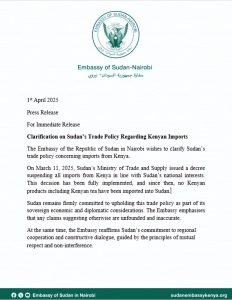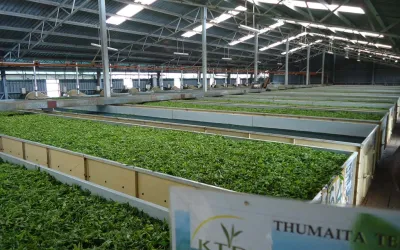The Embassy of Sudan in Nairobi has officially confirmed the full suspension of imports from Kenya, reinforcing its stance on national economic interests and sovereignty. This decision, enacted on March 11, 2025, by Sudan’s Ministry of Trade and Supply, prohibits the entry of Kenyan goods, including tea, into the Sudanese market.
According to the press release issued by the embassy, “This decision has been fully implemented, and since then, no Kenyan products including Kenyan tea have been imported into Sudan.” Sudan affirms that this policy aligns with its broader economic and diplomatic considerations, emphasizing that “any claims suggesting otherwise are unfounded and inaccurate.”

Economic and Trade Implications
The halt in Kenyan imports is expected to impact bilateral trade relations between the two nations, with Kenyan businesses exporting goods to Sudan likely facing revenue losses. Kenya’s tea sector, a major contributor to the country’s foreign exchange earnings, could particularly feel the strain if Sudanese buyers seek alternative markets.
Sudan’s commitment to this trade policy underscores its broader economic strategies, potentially prioritizing self-sufficiency or alternative trading partners. The move raises concerns about the diplomatic and economic trajectory of Sudan-Kenya relations, especially in light of regional economic partnerships under the African Continental Free Trade Area (AfCFTA).
Commitment to Regional Cooperation
Despite enforcing the trade suspension, Sudan’s Embassy in Nairobi reaffirmed the country’s dedication to regional cooperation and constructive dialogue.
“At the same time, the Embassy reaffirms Sudan’s commitment to regional cooperation and constructive dialogue, guided by the principles of mutual respect and non-interference,” the statement reads.
While the decision might present challenges for Kenyan exporters, the emphasis on diplomatic dialogue suggests that future trade negotiations could potentially lead to policy adjustments or alternative economic arrangements.
The trade suspension underscores the importance of diplomatic engagement in economic policies, especially within the East African region. Kenyan businesses affected by this decision may need to explore alternative markets or engage in discussions with Sudanese authorities to mitigate potential losses.
Observers will closely monitor the impact of this policy on Sudan’s market dynamics and Kenya’s export economy, as well as any forthcoming diplomatic engagements that could alter the trade landscape between the two nations.
For now, the Sudanese government remains firm on its trade policy, ensuring its economic decisions align with national interests while keeping the door open for regional cooperation.








































